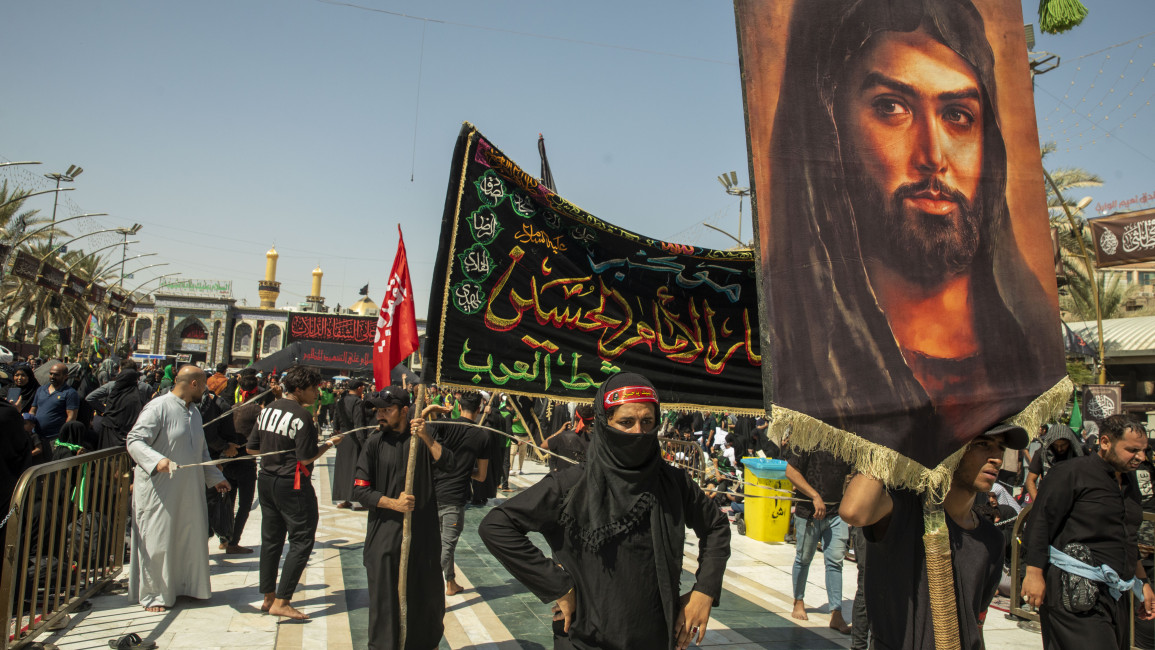Iraqi PM visits Karbala as over three million Iranian pilgrims attend Arbaeen
Mustafa al-Kadhimi, the Iraqi caretaker prime minister, paid a visit to the holy city of Karbala on Wednesday to follow up on security and service measures as millions of Shia pilgrims from around the world arrived to mark Arbaeen.
Al-Kadhimi, accompanied by several security and public service ministers, met with officials in the province and emphasised on protecting visitors and providing services for them, according to a statement by the Iraqi government.
"Karbala embraces a large number of pilgrimages during Arbaeen, as well as during 10th of Muharam, nevertheless the infrastructure in our province and across Iraq is poor," Kadhimi said in the statement. "However, the cooperation by people, state institutions, the local authorities and the holy shrines have big roles in reducing the obstacles."
رئيس مجلس الوزراء @MAKadhimi : كربلاء تستقبل عدداً كبيراً من الزائرين، في هذه الزيارة، وكذلك في العاشر من محرم، ومع كل هذا فإن البنى التحتية في محافظاتنا وفي عموم العراق غير متوفرة بشكل كامل، لكن تعاون الناس والمؤسسات والمحافظة والعتبات المقدسة تقوم بدور كبير لتذليل العقبات. pic.twitter.com/YWSSN2X62F
— المكتب الإعلامي لرئيس الوزراء 🇮🇶 (@IraqiPMO) September 14, 2022
Millions of Shia Muslims from around the world annually visit Iraq's holy city of Karbala, to attend the Arbaeen pilgrimage.
Arbaeen marks the end of the 40-day mourning period for the killing of Imam Hussein – a founding figure in Shia Islam and grandson of the Prophet Mohammed – by the forces of the caliph Yazid in 680 CE.
Iran's interior minister Ahmad Vahidi Wednesday was quoted by Iran's state media saying that the number of Iranians entering Iraq has exceeded three million, and around 1.5 million of them have already returned from the trip.
Eleven Iranian Shia Muslim pilgrims and their local driver died on Sunday in central Iraq when their minibus collided with a truck and burst into flames, a health official said.
Iraq's powerful cleric Muqtada al-Sadr on Sunday said that pilgrims should not hold weapons, and requested that Kadhimi's government not let Sadr's Saraya al-Salam militias or the Popular Mobilization Forces (PMF) control any checkpoints in or around the city.
Iraqi security forces recently confiscated weapons from Iranian visitors when they tried to enter the country through the official's border gates.
Political observers are cautioning of new chaos in Iraq by early next week, after Arbaeen ends, as Iran-backed Shia groups are trying to form a new government in defiance of Sadr and other liberal protestors.
Since the US-led invasion of Iraq in 2003, successive governments in Baghdad have been struggling to provide fresh drinking water, electricity and health services to r own citizens, especially during hot summer months.
Public anger over rampant corruption, the lack of basic public services, high unemployment rates, and foreign interferences in Iraq, were the main reasons for the October 2019 protests, in which more than 600 civilians were killed by Iraqi security forces and Iran-backed Shia militias.


![President Pezeshkian has denounced Israel's attacks on Lebanon [Getty]](/sites/default/files/styles/image_684x385/public/2173482924.jpeg?h=a5f2f23a&itok=q3evVtko)



 Follow the Middle East's top stories in English at The New Arab on Google News
Follow the Middle East's top stories in English at The New Arab on Google News


